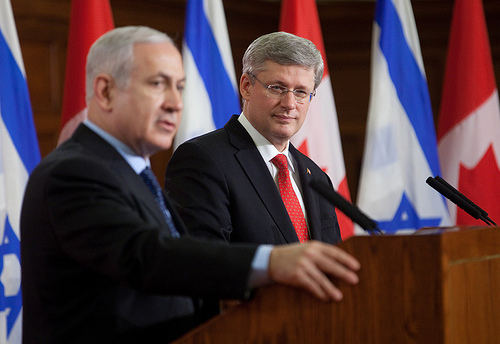Yesterday, Prime Minister Stephen Harper was honored at the annual Jewish National Fund (JNF) Negev Dinner. The historic purpose of the Negev dinners is, according to the JNF Canada website, to “[gather] support for the development of the Negev desert region.”
According to JNF Canada’s chief executive, Josh Cooper, this year’s event has been the most successful ever. With 20 separate project donors pledging $100,000 or more, and corporate tables for the event available for the same amount, it is no surprise that JNF Canada has managed to raise record funds. Proceeds from this year’s gala will go toward the newly named Stephen J. Harper Hula Valley Bird Sanctuary Visitor and Education Centre.
This year’s Negev dinner is particularly meaningful, as Palestinian Bedouin in the Negev (Al-Naqab) are presently threatened with increasing home demolitions, appropriation of historical lands and forced transfer. These threats are presently embodied in the Prawer-Begin Bill, approved by the Israeli Knesset on 24 June, 2013. The bill is currently undergoing its second reading in the Knesset and has been met with popular opposition both locally and globally.
Given Israel’s policies in the Negev, Stephen Harper’s presence at the gala signals Canada’s indifference towards the dispossession of Indigenous Bedouin and its unconditional support for Israeli apartheid.
The Prawer Plan, Israel’s most recent means of appropriating Palestinian land, seeks to expel around 70,000 Arab Bedouin citizens of Israel who live in 36 “unrecognized” villages. Despite the fact that many of these villages predate the creation of the state of Israel and, after the Nakba, the military government created many more, these villages continue to occupy a perpetually liminal and precarious space.
The historic neglect of Bedouin communities is well documented. Lack of recognition has meant exclusion from state planning and unconcern.
According to Adalah, Bedouin homes are “frequently demolished” and citizens live with “extremely restricted access to water, electricity, schools, roads or other social or health services.”
Importantly, Israel’s denial of recognition on the basis of insufficient documentation and proof of ownership is disingenuous: Israel does not apply the same criteria to Jewish settlements in the same areas. This inconsistency with regard to the application of laws is discriminatory.
Harper has pledged Canada’s unwavering support for Israel since the summer of 2006 when he declared Israel’s bombing of Lebanon “a measured response.”
In 2008-2009, Canada cheered from the sidelines as Israel’s “Operation Cast Lead” left 1400 Palestinians dead in what Amnesty International called “22 Days of Death and Destruction.” Again, in 2012, Canada supported Israel’s offensive in Gaza that, as Human Rights Watch noted, “violated the laws of war.”
And while Harper’s conservatives decried the use of chemical weapons by the Assad regime, not a word was uttered about Israel’s use of white phosphorus against Palestinians or its refusal to ratify the Chemical Weapons Convention.
Last November, Canada’s foreign minister, John Baird, stood before the United Nations General Assembly and accused the UN of “abandon[ing] policy and principle” while attempting to justify Canada’s contemptible position of voting against a Palestinian bid for non-member observer status.
One hundred and thirty-eight member states voted in favour of the Palestinian bid, while only nine nations voted against. The lackluster rejectionist front included the usual suspects, Israel and the United States, along with the Czech Republic, the Marshall Islands, Micronesia, Nauru, Palau and Panama.
Canada’s participation in this is indicative of a stance that is outdated, unjust and historically inept. Contrary to Canada’s position, when it comes to the dispossession of Bedouin, the international community has responded with concern.
In 2012 the UN Committee on the Elimination of Racial Discrimination condemned Israel’s treatment of Bedouin, noting, “[concern] about the current situation of Bedouin communities.” The resolution went further and recommended that Israel withdraw the “discriminatory” Law for the Regulation of the Bedouin Settlement in the Negev (Prawer Plan Law).
A few months later, the European Parliament explicitly called for the “withdrawal of the Prawer Plan by the Israeli Government.” Recently, 91 Canadian authors wrote a letter to the Harper government, adding their voices to the chorus of growing opposition to Israel’s plans in the Naqab.
Perhaps Canada’s support of Israel’s poor treatment of Bedouin should not come as a surprise: few countries can compare to Canada’s own egregious and horrific treatment of its indigenous populations.
Given the Canadian government’s uncritical support for Israel, it isn’t surprising that Harper was honored at this year’s JNF Negev dinner. After all, you don’t get a bird sanctuary named after you for nothing.
Paul Di Stefano is a teacher, activist and researcher from Montreal, Canada.




